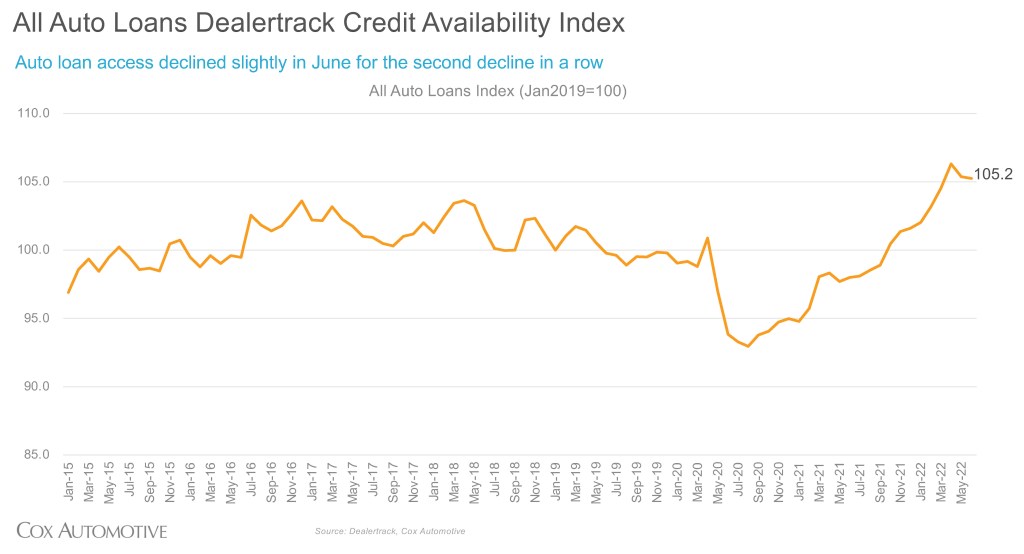Data Point
Auto Credit Availability Stable in June as Rates Continue to Rise
Monday July 11, 2022
Article Highlights
- Access to auto credit was little changed in June according to the Dealertrack Credit Availability Index for all types of auto loans.
- The All Loans Index declined 0.1% to 105.2 in June, reflecting that auto credit was slightly harder to get in the month compared to May.
- The index has declined for two consecutive months, but access was looser by 7.4% year over year, and compared to February 2020, access was looser by 6.1%.
Access to auto credit was little changed in June, according to the Dealertrack Credit Availability Index for all types of auto loans. The All Loans Index declined 0.1% to 105.2 in June, reflecting that auto credit was slightly harder to get in the month compared to May. The index has declined for two consecutive months, but access was looser by 7.4% year over year, and compared to February 2020, access was looser by 6.1%. The index in April had been the highest recorded in the data series going back to January 2015.

The credit availability factors were mixed in June, with some moving to help consumers and others moving against access. The average yield spread on auto loans narrowed, so rates consumers saw on auto loans were more attractive in June relative to bond yields. The average auto loan rate increased by 21 Basis Points (BPs) in June compared to May, while the 5-year U.S. Treasury increased by 32 BPs, resulting in a narrower average observed yield spread. Also helping consumers was lengthening in terms and decline in average down payment size.
Working against consumers was a lower approval rate, declining negative equity share, and a declining subprime share.
Most loan types saw small changes in their credit indices in June. All new loans and independent used loans tightened slightly, just like the All Loans Index, while new loans through non-captives, all used, certified pre-owned (CPO), and used loans through franchises loosened slightly. CPO loans loosened the most.
Credit access saw more movement by lender types in June, with banks and captives tightening the most but auto-focused finance companies loosening. On a year-over-year basis, all lenders had looser standards, with auto-focused financed companies having loosened the most.
Each Dealertrack Credit Availability Index tracks shifts in loan approval rates, subprime share, yield spreads and loan details, including term length, negative equity, and down payments. The index is baselined to January 2019 to provide a view of how credit access shifts over time. Across all auto lending in June, yield spreads narrowed, terms lengthened, and the down payment percentage declined slightly, and the moves in those factors made credit more accessible. However, the approval rate declined, negative equity declined, and the subprime share declined, so those factors moved against accessibility.
Measures of consumer sentiment decline again in June. The Conference Board Consumer Confidence Index® declined 4.4% in June when a larger decline had been expected, but the May index was also revised down. Most of the index decline was driven by a 9.9% decline in future expectations as views of the present situation were barely changed, down 0.2% from May. Plans to purchase a vehicle in the next six months increased but remained down year over year. The confidence index has not declined as much as the sentiment index from the University of Michigan, which declined 14.4% in June to a record low. The Michigan index is much more sensitive to inflationary pressures and stock market volatility as its questions focus on personal financial conditions, whereas the confidence survey focuses more on business conditions. The Morning Consult Index of Consumer Sentiment declined 4.5% in June, but it improved modestly in the final week of the month as gas prices came down slightly.
The Dealertrack Credit Availability Index is a new monthly index based on Dealertrack credit application data and will indicate whether access to auto loan credit is improving or worsening. The index will be published around the 10th of each month.
